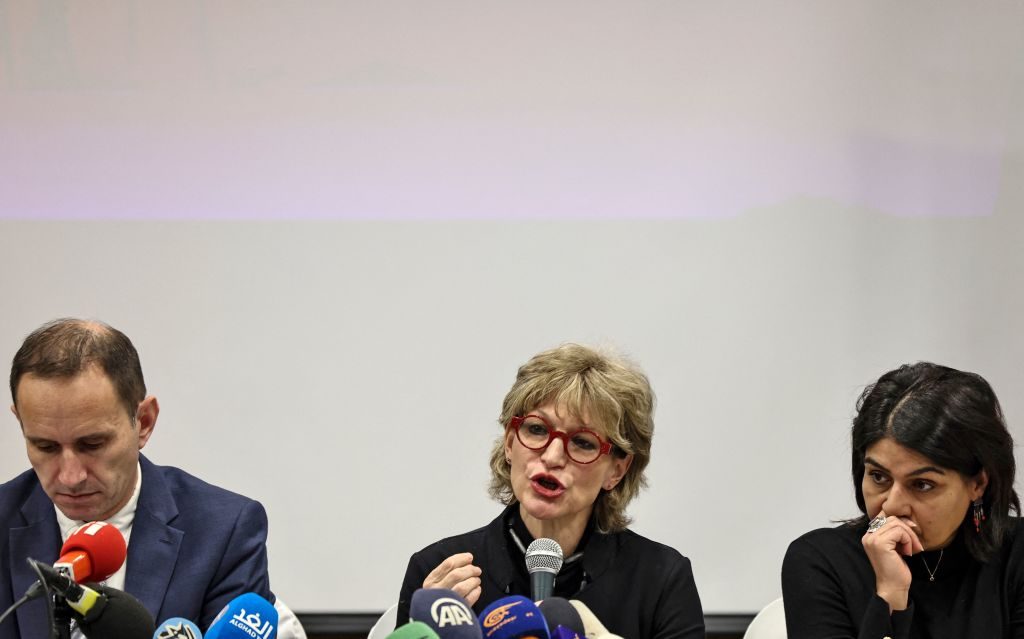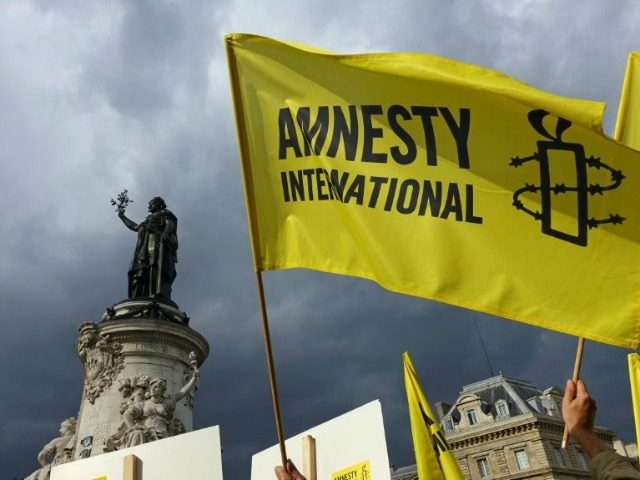UK-based Amnesty International has released a new report accusing Israel is of apartheid against the Palestinians. Here are five reasons why the claim is so preposterous and even hurtful to those who suffered under real apartheid rule.
It’s important to note first, that the Amnesty report fails to distinguish between Arabs in Israel (sometimes referred to as Palestinian citizens in Israel), Palestinians in the Palestinian territories and Palestinian “refugees” outside the territory.
The report falsely claims that “almost all of Israel’s civilian administration and military authorities” are involved “in the enforcement of the system of apartheid” on all those groups.

Agnes Callamard, the Secretary General of Amnesty International (C) attends a press conference together with Middle East and North Africa Research and Advocacy Director Philip Luther (L) and activist Orly Noy (R) in Jerusalem, on February 1, 2022. (RONALDO SCHEMIDT/AFP via Getty)
Now let’s take that a closer look:
- With regards to the first group, Israel’s Arab citizens – who account for 20% of the country’s population – enjoy full and equal rights under Israeli law. Arab Israelis hold the highest positions of power in Israel’s legislative, executive and judicial branches. Arabs have served as Supreme Court judiciaries and an Arab Islamist party currently sits in the ruling government.
- Let’s move onto the second group: Palestinians in the Palestinian Territories (i.e. the West Bank and Gaza). Those Palestinians are governed by either the Palestinian Authority (PA) in the West Bank or by Hamas in Gaza. Hamas is recognized as a terror group by the U.S. and EU. The PA, which was created with the support of the international community, has granted Israel security control in some disputed area. While we’re on the subject of apartheid, PA President Mahmoud Abbas has said that under no circumstances would an Israeli ever be allowed to live in a future Palestinian state. Meanwhile, Israel totally withdrew from southern Lebanon in 2000 and from Gaza in 2005. Both areas have since been turned into terror hubs, with Hezbollah and Hamas routinely launching rockets from those territories into Israel’s civilian population centers.
- Finally, we’ll move onto the final group, Palestinian “refugees” living elsewhere. Palestinian so-called refugees are the only refugees in the world that pass that status on to their descendants in perpetuity. One of the core issues in the conflict is the Palestinian demand for the “right of return” that would see those refugees and their descendants — who now number around 5 million — return to Israel in any final status agreement. Israel has categorically rejected this demand, deeming it a bid to destroy the Jewish state by demographics. Now, Amnesty International, in its 280-page report, is calling for the return of those refugees, not to a future Palestinian state, but to Israel proper – ergo, Amnesty is advocating for the end of Israel. And if we’re talking about apartheid, there are more than 200,000 Palestinian “refugees” living in Lebanon who live in abject poverty and extreme overcrowding and who are barred from working in many professions such as doctors, lawyers or civil servants. The same is true in Syria, and, to some extent, in Jordan, where almost half a million Palestinians live in refugee camps.
WSJ editorial: "The Amnesty report isn’t one more denunciation of the Israeli settlements in the West Bank. . . . The report treats Israel’s founding as the original sin from which all other offenses flow."https://t.co/2AjYDUuueW
— Elliot Kaufman (@ElliotKaufman6) January 31, 2022
4. The Amnesty report openly admits that it does not seek to use the South African apartheid as a measurement for Israel’s “crime of apartheid.” Instead, as the monitoring group HonestReporting points out, Amnesty conveniently cherry picks what ever works for its conclusion from the International Convention on the Suppression and Punishment of the Crime of Apartheid and the Rome Statute, documents that were undersigned by only half of the world’s nations, and were opposed by others including the U.S. “In doing so, Amnesty constructed a new definition of apartheid that, obviously, has not been adopted by any country,” HonestReporting said.
5. In apartheid regimes, the oppressed group isn’t usually wont to praise its oppressors – and certainly not for their democratic beliefs. Yet the majority of Palestinians – that is, Palestinians in the Palestinian Territories – have expressed that they admire Israeli democracy, 68 percent, according to this poll. Senior Arab officials in Israel, meanwhile, responding to Amnesty’s report, have expressed that while Israel is far from perfect, it is anything but an apartheid country.
When a Muslim Israeli minister needs to tell you that Israel isn’t an apartheid state, you know you have a problem.@amnesty how’s that report working out for you? #SHAMnesty https://t.co/YdIMBfouB4
— Tamar Schwarzbard (@TSchwarzbard) February 1, 2022

COMMENTS
Please let us know if you're having issues with commenting.